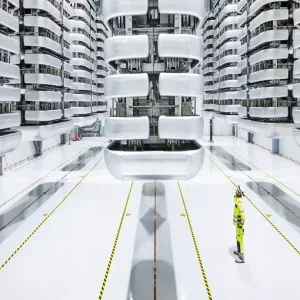Saft has been awarded its first contract for an energy storage system in Japan. The Li-ion battery system will be delivered to remote Japanese island Nii-Jima where it will store energy in a micro-grid that will integrate diesel gensets, solar panels and wind turbines.Takaoka Toko Co. Ltd, a Tepco subsidiary, selected Saft’s Intensium Max Li-ion containerised battery system to provide energy storage for the demonstration project, which is aimed at expanding the installation of renewable energy using systems. The ESS will perform operations such as ramp and frequency smoothing.
The project will comprise diesel generators, solar panels and wind power installations working in various combinations to optimise the usage of renewable energy resources.
The Japanese government has set targets to increase the proportion of electricity to be generated from renewable sources from the current 10 % to 13.5 % (approximately 141 billion kWh) in 2020 and 20 % by 2030. For an experimental period of 5 years, this project has as its principal objective to highlight the technical challenges (such as expected electric power quality and grid management) that need addressing when renewable energies – especially wind generation – are associated with electric power systems and to study the related solutions.
Niijima is a volcanic island in the Philippine Sea, South-East from Tokyo at about two and a half- hours by jet boat. Its small area and population of around 3000 people is the ideal location for this demonstration project as a miniature model of Japan in anticipation for 2030.
The ESS will comprise an Intensium Max 20 M medium power containerised Li-ion battery system, modified to offer a nominal storage capacity of 520 kWh and 1 MW peak power output. The battery will operate in combination with Takaoka-Toko’s intelligent control systems that enable large amounts of wind and other renewable energy based power to be integrated into diesel powered grids. The demonstration site is currently under construction. Installation and commissioning of the Saft ESS is scheduled for first quarter 2015.






